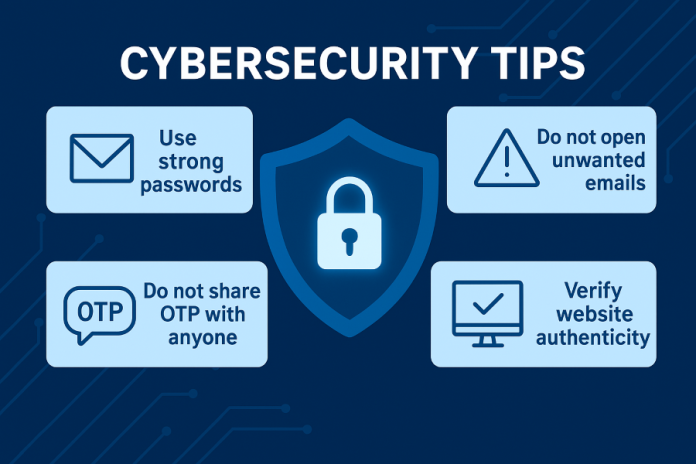Cybersecurity for Everyday Life: How to Stay Safe in a Connected World
We live in a world where our phones, laptops, and digital accounts are almost as important as the keys to our homes. Yet, while most of us would never dream of leaving our front door unlocked at night, we often leave our digital doors wide open. Cybersecurity is no longer just a concern for IT experts or large corporations; it is something every one of us must practice, every single day.
Why It Matters
Scams are becoming smarter and harder to spot. A friend recently told me about receiving a WhatsApp message from his brother, urgently asking for money. It had the same photo, the same name. He almost transferred the money before realizing it was a scam.
I have also seen phishing emails land in my inbox—some pretending to be from a courier company, others from banks. In Indonesia, many people have received fake messages from services like Gojek, Grab, or even PLN, offering refunds or prizes. They are often urgent in tone: “Your account has been blocked, click here to fix it.” These are designed to make us panic, and in that panic, we click.
The reality is that cybercrime does not discriminate. It affects individuals, families, and businesses. Indonesia has also seen a rise in what is called “digital arrest”—fraudsters posing as police, OJK, or even Interpol officials call unsuspecting victims and threaten them with arrest unless they pay money or share details. It is pure cybercrime, but it plays on fear and authority.
The Most Common Threats
Here are some of the most frequent cyber risks that touch our lives:
- Phishing emails and SMS: Fake links asking for logins, OTPs, or money.
- Weak passwords: Reusing “12345” or birthdays across accounts.
- WhatsApp hijacking: Fraudsters trick you into sharing an OTP, then lock you out of your own account.
- Facebook games and quizzes: Fun but often harvest your personal data.
- Public Wi-Fi risks: Hackers can snoop on traffic in airports or cafes.
- Ransomware: Criminals lock your computer files or website and demand money to release them.
Six Habits of Cyber-Smart People
The good news is that you don’t need to be an IT expert to stay safe. By practicing these six habits, you can protect yourself from most threats:
- Use strong passphrases. Instead of short, hard-to-remember passwords, create a phrase that is easy for you but hard for hackers. For example: CoffeeMorningJakarta2025!
- Turn on 2FA (Two-Factor Authentication). Use Google Authenticator or similar apps for your WhatsApp, email, and social media accounts. This way, even if someone has your password, they cannot log in.
- Think before you click. If you receive a link in an email or WhatsApp message, pause. Hover over it to check the URL, or simply don’t click if it looks suspicious.
- Keep your devices updated. Those software updates that pop up on your phone or laptop are often security fixes. Install them promptly.
- Avoid public Wi-Fi for financial transactions. Use your mobile hotspot instead.
- Verify invoices and payments. A two-minute phone call to confirm can save your business from serious fraud.
Extra Safety Tips
- Create a separate email address just for online shopping, downloads, and subscriptions. This keeps your main email safe.
- Teach your family. Children are especially vulnerable to oversharing online or clicking on games and apps that seem harmless. Talk to them regularly about online safety.
- Never share OTPs. Neither banks, nor law enforcement, nor WhatsApp will ever ask you for an OTP. If someone does, it’s a scam.
- Be cautious of authority scams. If someone calls saying you are “digitally arrested,” know this: there is no such legal process. It is a fraud designed to exploit fear. Hang up immediately.
What To Do If Something Goes Wrong
If you are hacked or scammed, act fast:
- Change your passwords immediately.
- Enable 2FA on all accounts.
- Inform your bank or service provider.
- Report the fraud to the Indonesian National Cyber and Crypto Agency (BSSN) or through the official portal aduancontent.id. You can also contact your bank’s fraud hotline directly.
- Monitor your accounts and financial statements.
One Indonesian small business owner shared how ransomware locked their files, with hackers demanding money to release them. Fortunately, they had proper backups and were able to recover without paying. Backups are often the difference between disaster and recovery.
Cybersecurity is not about fear—it is about confidence. It is about knowing that you have locked your digital doors just as you lock your front door. And, as with many things in life, awareness and small daily habits make all the difference.
As a community, let us share these tips with our families, staff, and friends. Staying safe online is not just an individual responsibility; it is a collective effort.
So I leave you with this question: What is one cyber habit you will change today?
by Poonam Sagar






